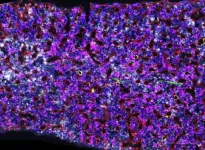(Press-News.org) Written by Jessica Colarossi
Microplastics—tiny shards of plastic debris—are all over the planet. They have made their way up food chains, accumulated in oceans, clustered in clouds and on mountains, and been found inside our bodies at alarming rates. Scientists have been racing to uncover the unforeseen impacts of so much plastic in and around us.
One possible, and surprising, consequence: more drug-resistant bacteria.
In a startling discovery, a team of Boston University researchers found that bacteria exposed to microplastics became resistant to multiple types of antibiotics commonly used to treat infections. They say this is especially concerning for people in high-density, impoverished areas like refugee settlements, where discarded plastic piles up and bacterial infections spread easily. The study is published in Applied and Environmental Microbiology.
“The fact that there are microplastics all around us, and even more so in impoverished places where sanitation may be limited, is a striking part of this observation,” says Muhammad Zaman, a Boston University College of Engineering professor of biomedical engineering who studies antimicrobial resistance and refugee and migrant health. “There is certainly a concern that this could present a higher risk in communities that are disadvantaged, and only underscores the need for more vigilance and a deeper insight into [microplastic and bacterial] interactions.”
It’s estimated that there are 4.95 million deaths associated with antimicrobial-resistant infections each year. Bacteria become resistant to antibiotics for many different reasons, including the misuse and overprescribing of medications, but a huge factor that fuels resistance is the microenvironment—the immediate surroundings of a microbe—where bacteria and viruses replicate. In the Zaman Laboratory at BU, researchers rigorously tested how a common bacteria, Escherichia coli (E. coli), reacted to being in a closed environment with microplastics.
“The plastics provide a surface that the bacteria attach to and colonize,” says Neila Gross (ENG’27), a BU PhD candidate in materials science and engineering and lead author of the study. Once attached to any surface, bacteria create a biofilm—a sticky substance that acts like a shield, protecting the bacteria from invaders and keeping them affixed securely. Even though bacteria can grow biofilms on any surface, Gross observed that the microplastic supercharged the bacterial biofilms so much that when antibiotics were added to the mix, the medicine was unable to penetrate the shield.
“We found that the biofilms on microplastics, compared to other surfaces like glass, are much stronger and thicker, like a house with a ton of insulation,” Gross says. “It was staggering to see.” The rate of antibiotic resistance on the microplastic was so high compared to other materials, that she performed the experiments multiple times, testing different combinations of antibiotics and types of plastic material. Each time, the results remained consistent.
“We’re demonstrating that the presence of plastics is doing a whole lot more than just providing a surface for the bacteria to stick—they are actually leading to the development of resistant organisms,” Zaman says. He directs BU’s Center on Forced Displacement, which has a mission to improve the lives of displaced people around the world. Past research has found that refugees, asylum seekers, and forcibly displaced populations are at an increased risk of contracting drug-resistant infections, due to living in overcrowded camps and having heightened barriers to receiving healthcare.
“Historically, people have associated antibiotic resistance with patient behavior, like not taking antibiotics as prescribed. But there is nothing a person has done to be forced to live in a particular environment, and the fact is they are at a higher exposure to resistant infections,” Zaman says. That’s why the environmental and social causes of drug-resistant superbugs cannot be ignored, he says. As of 2024, there were an estimated 122 million displaced people worldwide. According to Zaman, the prevalence of microplastics could be adding another element of risk to already underfunded, and understudied, health systems that serve refugees.
Gross and Zaman say that the next step in their research is to figure out if their findings in the lab translate to the outside world. They hope to begin studies with research partners overseas to watch refugee camps for microplastic-related antibiotic-resistant bacteria and viruses. They also aim to figure out the exact mechanisms that allow bacteria to hold such a strong grip on plastic.
“Plastics are highly adaptable,” Gross says, and their molecular composition could help bacteria flourish—but it’s unclear how that happens. One theory, she says, is that plastics repel water and other liquids, which allow bacteria to easily attach themselves. But over time, the plastics start to take in moisture. That means it’s possible for microplastics to absorb antibiotics before they reach the target bacteria. They also found that even when the microplastics were removed from the equation, the bacteria they once housed kept the ability to form stronger biofilms.
“Too often, these issues are viewed from a lens of politics or international relations or immigration, and all of those are important, but the story that is often missing is the basic science,” Zaman says. “We hope that this paper can get more scientists, engineers, and more researchers to think about these questions.”
This work was supported by the National Science Foundation.
Republishers are kindly reminded to uphold journalistic integrity by providing proper crediting, including a direct link back to the original source URL.
END
Microplastics could be fueling antibiotic resistance, Boston University study finds
Boston University researchers shocked to see that bacteria’s antimicrobial resistance is strengthened when exposed to plastic particles and point to a potential outsized impact on refugees
2025-03-11
ELSE PRESS RELEASES FROM THIS DATE:
Microplastics increase antimicrobial resistance
2025-03-11
Washington, D.C.—Microplastics are not just pollutants, but also highly complex materials that facilitate antimicrobial resistance, even without antibiotics, according to a new study. The findings were published in Applied and Environmental Microbiology, a journal of the American Society for Microbiology.
“Addressing plastic pollution isn’t just an environmental issue—it’s a critical public health priority in the fight against drug-resistant infections,” said lead study author Neila Gross, a Ph.D. candidate in the lab of Professor Muhammad ...
Endocrine Society elects Santoro as 2026-2027 President
2025-03-11
WASHINGTON—Endocrine Society members elected Nanette Santoro, M.D., of the University of Colorado School of Medicine in Aurora, Colo., as its 2026-2027 President. She will serve as President-Elect for a year beginning in July 2025 before becoming President in June 2026.
Santoro has served as E. Stewart Taylor Chair of Obstetrics & Gynecology at the University of Colorado School of Medicine since 2010. She is a well-recognized practitioner, dedicated mentor and leading researcher on studies of women with premature and age-appropriate menopause.
She has held many roles with the Endocrine Society, including serving as Vice President of Clinical Science, an author ...
Study explores effects of climatic changes on Christmas Island’s iconic red crabs
2025-03-11
The annual migration of Christmas Island’s red crabs – where millions of creatures cover its beaches as they make their way from land to sea – is a true natural spectacle.
However, little is known about whether and how the species might be impacted under the future environmental conditions created by the changing global climate.
A new study by scientists and graduates at the University of Plymouth has investigated one aspect of how such shifts might affect its earliest development.
Specifically, the research focused on whether lower ...
AI in engineering
2025-03-11
A review explores the role of AI in engineering, assessing the benefits and challenges of the synergy between the two fields. A 2004 DARPA contest pitted AI vehicles against one another in a race on 150 miles of dirt roads. The best-performing vehicle made it less than eight miles of the way. The next year, five vehicles finished a 132-mile course, and today driverless cabs are active in several major cities. Enthusiasts have suggested AI could improve transportation and manufacturing, medicine, consumer goods, and military technology. Rama Chellappa, Guru Madhavan, Ed ...
Dr. Megan Abbott and the University of Colorado awarded $450,000 establishing a Clinical Research Center of Excellence that will also serve as a second site for SYNGAP1 ProMMiS
2025-03-11
Mill Valley, CA – March 11, 2025 – The SynGAP Research Fund (SRF) dba Cure SYNGAP1, a 501(c)(3) nonprofit organization, has awarded a $450,000 grant to Dr. Megan Abbott and the University of Colorado to establish a Clinical Research Center of Excellence for SYNGAP1-Related Disorders at Children’s Hospital Colorado (CHCO).
This initiative expands the already established Natural History Study to the SYNGAP1 Prospective Multidisciplinary Multisite Study (ProMMiS) while providing specialized care for individuals affected by SYNGAP1-related disorders ...
Empire Discovery Institute appoints Dr. Ronald Newbold as Chief Executive Officer
2025-03-11
Rochester, NY – March 10, 2025 – Empire Discovery Institute (EDI), a leading non-profit drug discovery and development accelerator, is pleased to announce the appointment of Dr. Ronald Newbold as Chief Executive Officer (CEO).
Dr. Newbold, who joined EDI in 2021 as Chief Business Officer, has served as interim CEO since August 2022 and has been instrumental in driving the organization’s growth and success. Under his leadership, EDI has achieved significant milestones, including the growth of the Medicines Discovery ...
Douglas Hanahan, Ph.D., FAACR, honored with the 2025 Pezcoller Foundation-AACR International Award for Extraordinary Achievement in Cancer Research
2025-03-11
CHICAGO – The Pezcoller Foundation-American Association for Cancer Research (AACR) International Award for Extraordinary Achievement in Cancer Research will be presented to Douglas Hanahan, PhD, Fellow of the AACR Academy, during the AACR Annual Meeting 2025, to be held April 25-30 at the McCormick Place Convention Center in Chicago, Illinois.
Hanahan is the Ludwig Distinguished Scholar at the Lausanne Branch of the Ludwig Institute for Cancer Research. He is being recognized for his fundamental discoveries in cancer research that have had a far-reaching translational impact. Through the generation and characterization of innovative mouse models, Hanahan defined multistep ...
Mapping DNA's hidden switches: A methylation atlas
2025-03-11
Researchers have developed a comprehensive atlas that maps DNA methylation—a critical chemical modification governing gene activity—across 39 human cell types, revealing a complex landscape of epigenetic regulation. The study identified over 34,000 genomic regions exhibiting distinct ON/OFF methylation patterns at the two copies of the genome we inherited from our parents, a phenomenon known as allele-specific methylation. Some of these methylation changes are caused by genetic differences in genomic sequence of DNA, while others are due to parental imprinting—a ...
Beneficial genetic changes observed in regular blood donors
2025-03-11
Researchers at the Francis Crick Institute have identified genetic changes in blood stem cells from frequent blood donors that support the production of new, non-cancerous cells.
Understanding the differences in the mutations that accumulate in our blood stem cells as we age is important to understand how and why blood cancers develop and hopefully how to intervene before the onset of clinical symptoms.
As we age, stem cells in the bone marrow naturally accumulate mutations and with this, we see the emergence of clones, which are groups of blood cells ...
New research reveals psychological ‘booster shots’ can strengthen resistance to misinformation over time
2025-03-11
A new study has found that targeted psychological interventions can significantly enhance long-term resistance to misinformation. Dubbed “psychological booster shots,” these interventions improve memory retention and help individuals recognize and resist misleading information more effectively over time.
The study, published in Nature Communications, explores how different approaches, including text-based messages, videos, and online games, can inoculate people against misinformation. The researchers from the Universities of Oxford, Cambridge, Bristol, Potsdam and King’s College London conducted five large-scale experiments with over ...
LAST 30 PRESS RELEASES:
Globe-trotting ancient ‘sea-salamander’ fossils rediscovered from Australia’s dawn of the Age of Dinosaurs
Roadmap for Europe’s biodiversity monitoring system
Novel camel antimicrobial peptides show promise against drug-resistant bacteria
Scientists discover why we know when to stop scratching an itch
A hidden reason inner ear cells die – and what it means for preventing hearing loss
Researchers discover how tuberculosis bacteria use a “stealth” mechanism to evade the immune system
New microscopy technique lets scientists see cells in unprecedented detail and color
Sometimes less is more: Scientists rethink how to pack medicine into tiny delivery capsules
Scientists build low-cost microscope to study living cells in zero gravity
The Biophysical Journal names Denis V. Titov the 2025 Paper of the Year-Early Career Investigator awardee
Scientists show how your body senses cold—and why menthol feels cool
Scientists deliver new molecule for getting DNA into cells
Study reveals insights about brain regions linked to OCD, informing potential treatments
Does ocean saltiness influence El Niño?
2026 Young Investigators: ONR celebrates new talent tackling warfighter challenges
Genetics help explain who gets the ‘telltale tingle’ from music, art and literature
Many Americans misunderstand medical aid in dying laws
Researchers publish landmark infectious disease study in ‘Science’
New NSF award supports innovative role-playing game approach to strengthening research security in academia
Kumar named to ACMA Emerging Leaders Program for 2026
AI language models could transform aquatic environmental risk assessment
New isotope tools reveal hidden pathways reshaping the global nitrogen cycle
Study reveals how antibiotic structure controls removal from water using biochar
Why chronic pain lasts longer in women: Immune cells offer clues
Toxic exposure creates epigenetic disease risk over 20 generations
More time spent on social media linked to steroid use intentions among boys and men
New study suggests a “kick it while it’s down” approach to cancer treatment could improve cure rates
Milken Institute, Ann Theodore Foundation launch new grant to support clinical trial for potential sarcoidosis treatment
New strategies boost effectiveness of CAR-NK therapy against cancer
Study: Adolescent cannabis use linked to doubling risk of psychotic and bipolar disorders
[Press-News.org] Microplastics could be fueling antibiotic resistance, Boston University study findsBoston University researchers shocked to see that bacteria’s antimicrobial resistance is strengthened when exposed to plastic particles and point to a potential outsized impact on refugees


